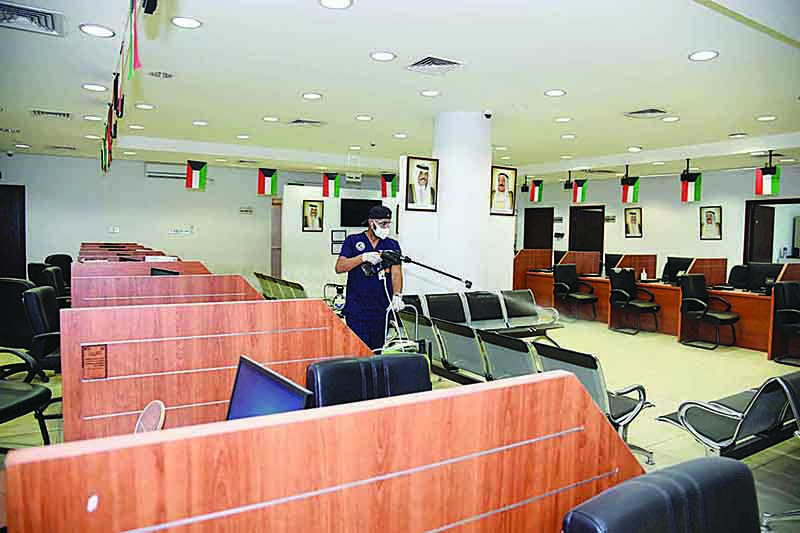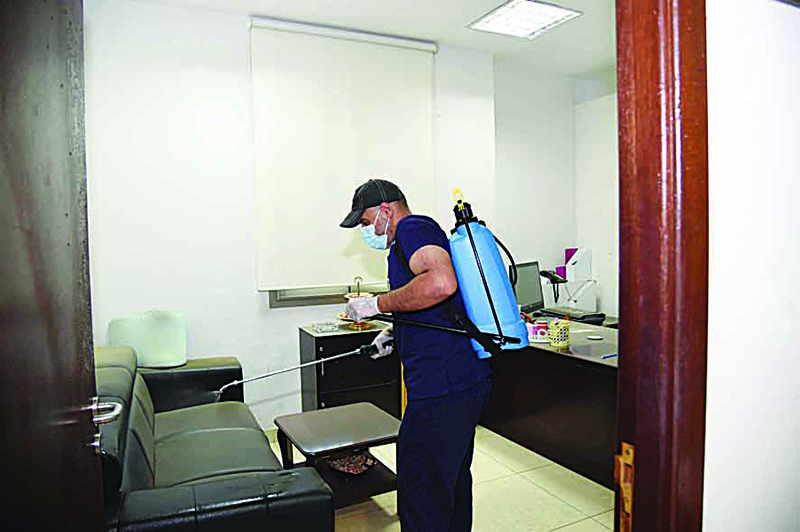
KUWAIT: Ministries and government institutions should abide by the health conditions when they resume work on Tuesday, June 30, the Civil Service Commission (CSC) said. The public sector should limit use of papers as well as personal delivery of documents within, or between, the institutions and to communicate through the government-to-government (G2G) system, CSC Undersecretary Bader Al-Hamad told an online news conference following a Cabinet meeting Thursday.
The Cabinet, during an extraordinary meeting chaired by His Highness the Prime Minister Sheikh Sabah Al-Khaled Al-Hamad Al-Sabah, decided to move to the second phase of a plan aimed at restoring normal life amidst the coronavirus pandemic. The government decided to start the second phase on Tuesday with the curfew shortened to be between 8:00 pm until 5:00 am.
Employees will be allowed to return to their offices with a maximum of 30 percent of the total workforce. Hamad said the Ministry of Health would be exempted from this decision because they needed to be fully operational to confront the pandemic. State departments, he added, should carry out regular disinfections and inform the employees about instructions issued by the health authorities. Employees should limit their movements among departments and offices, he said, and a limited number of people should use elevators to guarantee physical distancing.
Restaurants inside the government buildings will not offer any services, said Hamad, noting that a ban would be imposed on gatherings, smoking or praying halls. Hamad said employees should be apart by two meters. Hamad, meanwhile, said the government was replacing expatriates with Kuwaiti nationals at the public sector as part of a five-year plan, which was in its third year now.

Back to normalcy
Health Minister Sheikh Dr Basel Al-Sabah said meanwhile that the success of the second stage of the plan to go back to normalcy in Kuwait will be in the hands of citizens and residents. In a press conference after the meeting, the Health Minister said that Kuwait had improved its position on curbing the spread of the novel coronavirus (COVID-19) from the previous period especially during Ramadan and Eid Al-Fitr when the load on hospitals was at 85 percent. Thanks to the lockdown, the load was decreased to 40 percent in ICUs during this month and 30 percent in hospitals nationwide, he indicated.
The three-week second phase of national plan to bring back life to normal will be less restrictive; however, people of Kuwait will now have the increased responsibility to combat the spread of COVID-19, approaching the matter with a cautious optimism. The second phase will witness the opening of commercial complexes, malls, parks, and other places of leisure between 10:00 am and 06:00 pm. The minister urged people to become more responsible in the upcoming period for their sake so that all of society could overcome this pandemic. Sheikh Dr Basel Al-Sabah said that though restrictions were being eased, the fact of the matter is that it was time to be more vigilant to prevent the further spread of the coronavirus.
Health situation assessment
The decisions made during the meeting as part of the second phase of returning back to normalcy include appointing Health Minister Dr Basel Al-Sabah to continue assessing the health situation in the lockdown areas of Jleeb Al-Shuyoukh, Mahboula, and Farwaniya to better handle the situation and curb the spread of COVID-19. A report on the situation will be relayed to the Cabinet, government spokesperson Tareq Al-Merzem said during the press conference.
He added that the Cabinet had decided to form a main committee, headed by the Health Minister and a number of fellow officials, to follow up on health measures regarding curbing the spread of the coronavirus (COVID-19). The committee will be task with holding entities responsible for not abiding by anti-COVID-19 health regulations.
Merzem urged citizens and residents alike to abide by health and safety regulations in the upcoming period to prevent the further spread of coronavirus in society. The Cabinet had to assign concerned bodies to take necessary measures to ensure that the economy would recover, providing assistance to the private sector to revitalize the work market. —KUNA










